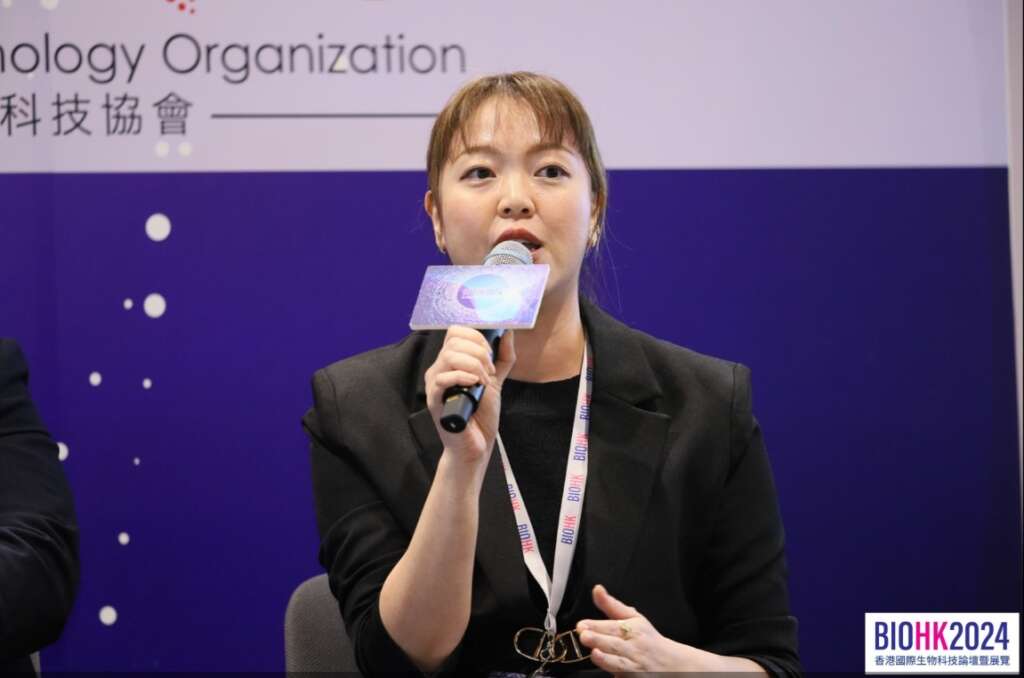Hong Kong’s government has accentuated support to the research and development (R&D) in life and health technology and fostered more businesses and start-ups from around the world to invest in the city.
Speaking to biotech firms and venture capitals’ top management, executives and investors on the third day of BIOHK 2024 conference, Dr Cathy Lui Nga-ping (雷雅萍), Principal Manager (Biotechnology Enterprise) of Invest Hong Kong, has highlighted the development and achievements of the city’s life and health sciences industries and roadmaps for global biotech businesses to tap into local markets.

Hong Kong has been dedicated to supporting to R&D and global enterprises and start-ups in biotech industry.
With strong research capabilities, Hong Kong is an ideal magnet to connect the Mainland and the rest of the world in biotech development.
“The government has supported biotech enterprises on research and development,” said Lui. She earned her PhD in neuroscience from Hong Kong Baptist University, where she also obtained her biology undergraduate degree. With a prestigious post-doctoral fellowship from the American Parkinson Disease Association, she furthered her nanomaterials research at the Northwestern University in the US.
“There are different schemes to support different stages of projects,” said Lui, adding that there are also diverse schemes to support enterprises from ideal to market stages. Overseas companies can set up and expand their operations in the city.
In the panel discussion on “Biomedical Imaging: Future application, policy and business”, Angus Chen, a partner in PwC Hong Kong’s Capital Market Service Group, said investors on biotech businesses not only focus on if they will yield a good return, but also whether the businesses they have made investment have possessed disruptive technologies.

Chen said investors have aspirations that their biotech enterprises’ technologies can “influence the whole world, whole economy and are disruptive”. The pursuit of monetary return is superficial as investors have gained more understanding on the importance of biotech to the world.
Recently, the government’s Office for Attracting Strategic Enterprises has attracted about 50 strategic enterprises which are committed to investing more than HK$40 billion in the city and creating over 13,000 jobs, the majority of which would be R&D and management positions. About half of the strategic enterprises have been engaged in life and health technology and will establish their R&D centers or regional headquarters in Hong Kong.
PRECISION NEURO-THERAPEUTICS
In another panel session on “Targeting the Brain: Precision Neuro-therapeutics”, Professor Yu Jintai (郁金泰教授), who is a clinical neurologist and currently serves as the Deputy Director of the Department of Neurology at Huashan Hospital, said that Alzheimer’s disease is the most common neurodegenerative disorder.

Professor Yu, who is also Executive Deputy Director of the Institute of Neurology at the Fudan University, said Alzheimer’s disease is the fifth leading cause of death in China after diseases including stroke and lung cancer.
Professor Yu cited a recent UK research study published in Nature Aging in February this year that an analysis of about 1,400 blood proteins has identified biomarkers which can be used to predict the risk of suffering from dementia up to 15 years before diagnosis.

The findings have marked a step towards a tool that scientists have been in search of for decades – blood tests that can detect Alzheimer’s disease and other forms of dementia at early stage.
Researchers screened blood samples from more than 50,000 adults in the UK Biobank, about 1,410 of whom developed dementia in a 14-year period. They have found that high blood levels of four proteins, including glial fibrillary acidic protein (GFAP), have been strongly associated with dementia.
In the panel session, Dr Charles Hu (胡正忠博士), who is Founder and Chief Executive Officer of Ryoden Medical Holdings, and Co-founder of Incando Therapeutics, said that there are two major types of light treatment, which are Photodynamic therapy and Photobiomodulation.

Photodynamic therapy is scientifically accepted and the US Food and Drug Administration (FDA)-approved for external indications.
Incando Therapeutics has combined wireless power and implanted electronics to enable light-based therapies to be repeatable and reach deep in the body.
The company’s DeepLight system has marked a novel, miniature and implantable medical device system to enable safe and repeatable at-home treatment against recurrent cancers. The product has received preliminary approval for first-in human clinical trial for brain cancer.

“We have a lot of technology in engineering to ensure the connectivity of the device from far distance,” Dr Hu said, adding patients can walk, move around and exercise and all these will not affect the treatment itself after the implantation of the device. The human safety trial will begin next year.
He said the company’s goal is to extend the treatment for patients on demand once the device is implanted in the body.
CYBERPORT SUPPORTS AI DEVELOPMENT

In another panel session on medical technology, Victor Yim (嚴滌宇), Head of Fintech of Cyberport, said as Hong Kong’s digital tech flagship and incubator for entrepreneurship, Cyberport has strived to inject impetus on digital economy through innovation and technology.
Cyberport has been dedicated to supporting AI and computing power needs, as well as wooing more global talents and R&D projects to Hong Kong, he said.
Images are from BIOHK 2024.
